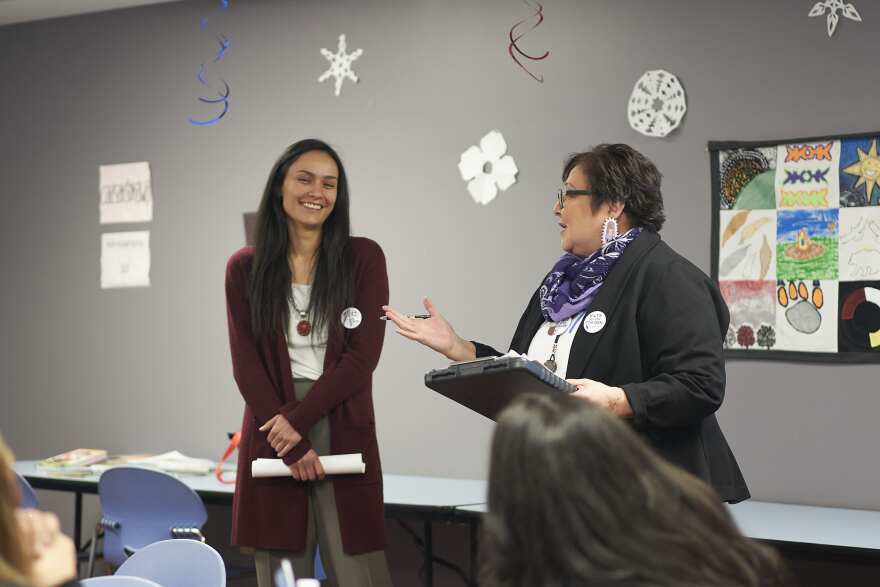On the Thursday before Election Day, parents and children roamed table to table, collecting swag, at a community health fair hosted by the Gerald L. Ignace Indian Health Center on Milwaukee’s south side.
Parents could get their kids’ vaccine records checked, take their blood pressure, and talk to a dentist. And, they were getting reminders to vote.
Anne Egan-Waukau, an enrolled member of the Menominee tribe, could be heard introducing herself to passers-by: “What we’re doing here is talking about voting. Have you registered to vote? Have you voted yet? Do you know where to go?”
Egan-Waukau is an enrolled member of the Menominee tribe. And, she’s the urban organizer for Wisconsin Native Vote, a nonpartisan program of Wisconsin Conservation Voices focused on turning out Indigenous voters across the state. She said many voters she’s spoken to this election season have been concerned about the environment, incarceration, and access to abortion.
Egan-Waukau mostly focuses on Milwaukee, which is home to almost 10,000 Indigenous people, according to the latest Census. But the Census has been unreliable, and some experts have said that’s an undercount.
Being here, Egan-Waukau said, is about meeting voters where they’re at. Over the past year, she’s been going to health fairs like today’s, powwows, and bingo clubs.
“I usually talk to them before the bingo,” she said. “Once bingo starts, forget about it.”
She said the Native community’s vote is powerful. “They say that during the last presidential race, the Native vote contributed to Biden winning Wisconsin. I believe that.”
That’s attributed to the fact that Biden won Wisconsin by around 20,600 votes. Counties with big Native populations, such as Menominee, which overlaps with the Menominee tribe’s land, voted overwhelmingly for Biden.
When Egan-Waukau connects with voters, she often shares her own voting story. Around two decades ago, she showed up to vote, and a poll worker tried to stop her.
“She said, ‘You can’t vote. Indians don’t vote,’” Egan-Waukau said. “I give her this, she probably recalled when we didn’t have the right. We were one of the last groups to get the voting right. I do know, however, there are many Native people who would have walked away.”
The story makes people mad. Egan-Waukau encourages them to act on that anger: We do have a vote and we should use it, she tells them.
Native Americans were barred from voting until 1924, when Congress passed the Indian Citizenship Act. But even then, many states kept them from voting, until the Voting Rights Act passed in 1965.
Today, many Native communities still experience difficulty voting, with barriers like poor internet access or distant polling places — a legacy of colonialism. When the Wisconsin Supreme Court ruled last summer that most ballot drop boxes aren’t allowed, that limited options more.
“It’s sad that now in this time, people are still trying to stop us from voting, when our main concern is the environment and the sovereignty of our people,” Egan-Waukau said. “We have to fight for that.”
In March, at Milwaukee’s Ho-Chunk office, Wisconsin Native Vote hosted a dinner to discuss why this election should matter to Native communities.
The state’s high court takes on issues like labor disputes, criminal law, and — back in 2020 — COVID-19 emergency orders.
Egan-Waukau points out that the pandemic hit Native people hard. According to the DHS, Native American residents experienced death rates 1.2 times the rate of white Wisconsinites. So when the Wisconsin Supreme Court overturned the statewide mask mandate, she felt that hurt her community.

Allison Neswood, Diné, is a voting rights attorney with the Native American Rights Fund. She spoke about the importance of the race.
“Native Americans in Wisconsin are actually incarcerated among the highest rates of any population in the state,” she said. “Studies show that who was on the court can likely impact these outcomes.”
In the coming years, the state Supreme Court is expected to weigh in on Wisconsin’s 1849 abortion ban, as well as voting laws and gerrymandered election maps leading up to the 2024 presidential election. Another lawsuit moving through the courts challenges the state’s authority to hold polluters accountable for spilling toxic substances.
“These are issues that are definitely heavily debated across all communities, and nationally,” Neswood said. “But they can really have a disproportionate effect in Native communities as well.”
Back at the health fair, Jessica Martinez greeted people as they came in the door. She’s Yaqui and Mescalero Apache, and a community health worker at the center. And she’s definitely voting.
“I think that we as Native American people need to come out to vote,” said Martinez, who was concerned about supporting incarcerated members of her community. “I think that’s the only way that our voice is recorded.”
The clock was ticking, and upstairs, Egan-Waukau told as many people as she can.
“The next 10 years are going to really have a big impact on our people and our lives,” she said. “I always say, skovoteden!”
Need help learning how to vote on April 4? Our voter guide has the information you need on the voting process and how to participate.
_








